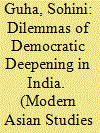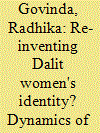| Srl | Item |
| 1 |
ID:
179409


|
|
|
|
|
| Summary/Abstract |
The political assertion by subalterns (specifically lower and backward castes) that India witnessed from the 1990s onwards, and the formation of governments by parties representing these groups in Uttar Pradesh and Bihar, two electorally critical North Indian states, contributed significantly to the deepening of India's democracy. But these lower caste governments met with vehement resistance from privileged strata, and from a section of state actors themselves, in particular, the bureaucracy. These governments adopted a range of strategies to counter this resistance in turn, which had the effect of bringing the procedural and substantive elements of democracy into sharp conflict. The project of lower and backward caste empowerment was defined by a politics of levelling, which placed great value on instantly visible egalitarian outcomes, even when these could only be achieved by denting the rule of law and weakening public institutions. But it was precisely on account of its ability to deliver instant egalitarian fixes (albeit on an ad-hoc and sporadic basis) that this politics commanded so much legitimacy among subordinate groups. Drawing on ethnographic research conducted in Uttar Pradesh, and secondary literature on backward caste politics in Bihar, this article explores the consequences that this prioritizing of right outcomes over proper procedures had on public culture in North India. It argues that this prioritizing of consequences over means bred a widespread impatience with a procedural conception of democracy, which was seen as obstructing the modalities that went to secure justice in real life.
|
|
|
|
|
|
|
|
|
|
|
|
|
|
|
|
| 2 |
ID:
084244


|
|
|
|
|
| Publication |
2008.
|
| Summary/Abstract |
Dalit or ex-untouchable women's voices and perspectives have been marginalized not only in Dalit movements but also in predominantly upper-caste Hindu-led women's movements. This paper aims at exploring the unheard voices and perspectives of Dalit women in the context of Dalit assertion in the state of Uttar Pradesh, north India. Scholarly writing examines the different facets of Dalit political assertion led by the Bahujan Samaj Party in Uttar Pradesh. Few scholars, however, examine the ways in which individual and organizational actors engage with women of Dalit castes through social activism in the state. This paper is an attempt to do so. Specifically, it examines, with special reference to issues of culture and identity, the engagement of a grassroots women's non-governmental organization with rural Dalit women in southern Uttar Pradesh. The paper begins with an enquiry into why engagement with issues of culture and identity is necessary for social activism with Dalit women, and how it is carried out. It then examines whether social activism and electoral politics with Dalit women cross-cut each other, and also what implications this or its lack has for the women. Finally, the paper asks how far activism and politics can go towards re-inventing Dalit (women's) identity.
|
|
|
|
|
|
|
|
|
|
|
|
|
|
|
|